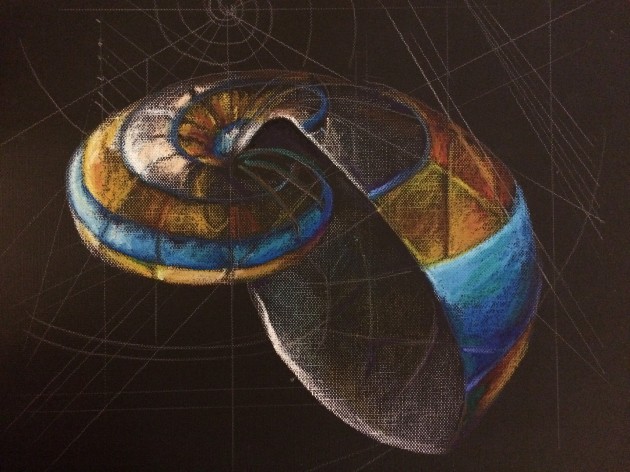Author Archives: Eden Gordon
August 28, 2017 by Eden Gordon
A Jewish New Yorker Becomes a Tibetan Pop Star. Plus… She Sings in Yiddish on Mongolian TV.

Ulaanbaatar, Mongolia at night.
Amalia Rubin has covered a lot of ground. I spoke to her recently via Skype, from my house in New York to her apartment in Ulaanbaatar, Mongolia’s capital city, where she has been living for two years. We bonded over our cats, who both wouldn’t stop climbing across our respective computer keyboards. In person (or in a pixelated reproduction of a person) Amalia Rubin is funny, charismatic, and full of incredible stories ranging from hysterical to heart-wrenching.
And she certainly has ample experience to draw from: she’s been a Tibetan pop star, sang in Yiddish with a Mongolian band on a Mongolian singing competition, speaks and writes in fluent Tibetan, and is now working on a book about Mongolian shamanism, all while teaching and promoting culturally sustainable development and maintaining her Jewish culture.
Her dedication to both her own culture and others’ is remarkable. She has pulled disparate threads of her life and worldview into a strikingly harmonious composition.
- 1 Comment
August 17, 2017 by Eden Gordon
Emotions & Math: Rebecca Newberger Goldstein on Orthodoxy, Reason, and Love
 When Rebecca Newberger Goldstein speaks and writes, her words are often undercut by a slight but unmistakable sense of humor. It’s as if she is perpetually half-smiling at the impossibly contradictory paths that her life has taken.
When Rebecca Newberger Goldstein speaks and writes, her words are often undercut by a slight but unmistakable sense of humor. It’s as if she is perpetually half-smiling at the impossibly contradictory paths that her life has taken.
It’s a humor that belies a deep, malleable understanding. I was able to experience this firsthand when I heard her speak at a reunion for Barnard College alumnae this June. I am just about to enter my junior year at Barnard, but I was at the reunion with my grandmother, who graduated in 1962. We had just emerged from a long and lively discussion with some members of her graduating class, and we made our way to a familiar lecture hall to hear this self-professed “wayward philosopher” discuss her career.
Before I heard her speak that day, I actually hadn’t heard of her at all, something that seems incomprehensible to me now; since that day, it seems I see her books displayed front and center in every bookstore I enter.
- 2 Comments
July 20, 2017 by Eden Gordon
Cannibal Mermaids, Dybbuks, Golems, and Lilith Herself: Feminist Retellings of Jewish Folktales
I saw the Polish film “The Lure” in the West Village a few months ago. The story riffs on The Little Mermaid in a very unexpected way. Ariel is no longer a fork-wielding dilettante, but instead has morphed into two sharp-fanged, angel-voiced, flesh-eating mermaids, who sing, dance, and devour their way through Communist Poland’s underground nightclub scene.
I often find myself thinking about types of feminist reclamation, both the kind that equips traditionally submissive women with sharp fangs and the kind that turns sharp-fanged monsters into powerful protagonists. These reclamations are not always completely triumphant. After all, the fundamental nature of a “reclamation” is that something must be re-made: essentially, changed. Still, having feminist retellings is far better than leaving the stories in their original forms, where the woman’s voice is often left out entirely.
Aside from Lilith, one of the central Jewish folkloric figures reclaimed by feminists is, surprisingly, the dybbuk. Traditionally, this creature was a formless ghost who possessed women and was often blamed for their “hysteria.” It rose to prominence throughout the Jewish Diaspora, popularized among the Eastern European Jews in folk rituals and literature. S. Ansky’s play “The Dybbuk,” or “Between Two Worlds,” which had its Yiddish-language premier in Warsaw in 1920, tells of a woman possessed by her dead suitor’s spirit; the play has been lauded as a nostalgic portrayal of disappearing shtetl life. Its voiceless heroine, Leah, dies at the end, consumed by the spirit within her. It’s the story of a female whose body is possessed by a masculine spirit, and about the often violent subjugation of the female voice. But it’s more a blunt depiction of the problem than a triumphant feminist redemption.
- No Comments
July 14, 2017 by Eden Gordon
This Website Helps Progressive Female Candidates Run for Office
Eliza Cussen was on her way to see “Wonder Woman”, and listening to an episode of her favorite podcast, “Call Your Girlfriend.” This one focused on women in politics (or the lack thereof). Like many would in this situation, she was wondering: what can I do?
Right then, she decided to create what is now Project Sheila, an organization dedicated to helping female politicians launch campaign websites. Cussen has been interested in web design for most of her life, and was working as a digital communications specialist when she had the idea. She saw that although she did not have significant funds to donate to campaigns, she could use her expertise to help in another way. She put out a call to friends in her network, asking if anyone needed help with web design, and received several requests right away. Around three weeks later, Project Sheila went live.
- No Comments
June 21, 2017 by Eden Gordon
Being Jewish In College. It’s More Complicated Than They Think.
 The Forward recently published a survey that asked, “What makes a college ideal for the Jewish student? Is it the presence of pro-Israel clubs? Kosher food options? Jewish fraternities and sororities? Something else altogether?”
The Forward recently published a survey that asked, “What makes a college ideal for the Jewish student? Is it the presence of pro-Israel clubs? Kosher food options? Jewish fraternities and sororities? Something else altogether?”
The question inspired a second glance, and then a more critical investigation. I asked a few of my friends what they feel has been most important to them as Jewish college students. A constant theme in their responses? Pro-Israel clubs, Kosher food options, or fraternities and sororities are not what they cite as defining forces in their religious lives.
I began to think about my own experience. I grew up in a largely Jewish community but for most of my life had put my faith on a back burner. Since coming to college I have become much more spiritual than I was before, finding new solace in the idea of God, but I still have not joined up with many Jewish student groups. I began to wonder—do I count as Jewish without being part of a community? And where do I belong amidst debates about Jewish identity?
I am sure I am not alone in my position on what feels like the fringes of the Jewish community. The only conclusion I can come to is that being the college experience is a complex experience for a Jewish student, one that refuses to yield easy answers. But this space of ambiguity can be a productive one, undoing stereotypes and producing questions that I believe can sometimes be more fruitful than answers.
- No Comments
 Please wait...
Please wait...